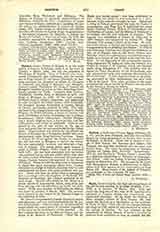

Casium, a titular see of Lower Egypt (Ptolemy, IV, v, 12), not far from Pelusium, and near the sandhills known by Greek geographers as Kasion Oros, today El-Katie, or El-Kas. There was at Casium a temple of Zeus Kasios, the Aramean god Qasiou, and Pompey, who had been murdered near the place, was buried there. The town is mentioned in Georgius Cyprius (ed. Geiser, 694), Hierocles’ “Synecdemos” (727, 2), and Parthey’s “Notitia Prima”, about 840, as a bishopric depending on Pelusium in Augustamnica Prima. Only one bishop is known, Lampetius, present at Ephesus in 431. He was sent by St. Cyril, with Hermogenes, Bishop of Rhinocorua, to Rome, where both were present at the consecration of Pope Sixtus III. Many letters of St. Isidore of Pelusium are addressed to him (Lequien, II, 545).
S. PETRIDES

